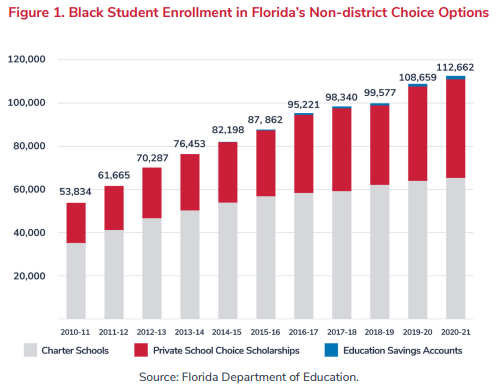The shift to an increasingly choice-driven education landscape for Black students in Florida has been driven by Black parents, who have enrolled their children in choice programs in growing numbers and made it so they cannot be ignored politically. “Options make it so that I can have school that works for my child,” said Brandi Evans, who has three children at Icon Preparatory School, a predominantly Black private school, pictured above, that is serving choice scholarship students in Tampa. With education choice, “I get to control the narrative.” PHOTO: Lance Rothstein
Editor's note: This special report was compiled by Denisha Merriweather, director of public relations and content marketing at the American Federation for Children; Dava Hankerson, director of enterprise data and research at Step Up For Students; Nathaniel Cunneen, communications associate at the American Federation for Children; and Ron Matus, director of policy and public affairs at Step Up For Students.
It has been 31 years since the first modern private school choice program began in Milwaukee, 29 years since the first charter school opened in Minnesota, and 10 years since Arizona created the nation’s first education savings account program.
Yet in many states, the opportunity for America’s 7.7 million Black public-school students to access these potentially life-changing learning options remains out of reach.
Florida is a notably bright exception.
Florida has more than 600,000 Black students, among the highest number of any state. It has among the most expansive suite of education choice options. And now it has among the highest number of Black students enrolled in those options.

The number of Black students participating in Florida’s non-district choice options has more than doubled in the past decade. Proportionally, about 1 in 6 Black students in Florida is now enrolled in a private school via a choice scholarship or a charter school.
The latter shouldn’t be a surprise.
Black student achievement across America continues to lag. Black residents are more likely to have negative views of neighborhood schools. Black parents are particularly supportive of school choice.
Yet the extent to which Black parents, educators and communities have embraced choice in Florida has been little noticed by the press, policymakers and the general public, both in Florida and beyond.
This report – a joint effort between Black Minds Matter, the American Federation for Children, and Step Up For Students – seeks to spotlight those trend lines, and to highlight evidence of their positive impact on Black students.
It calls attention to Black educators who have been empowered by choice to innovate.
It also seeks to spur discussion in states where Black parents continue to have few meaningful choices.
Among the key takeaways:
To see the full report, click here.